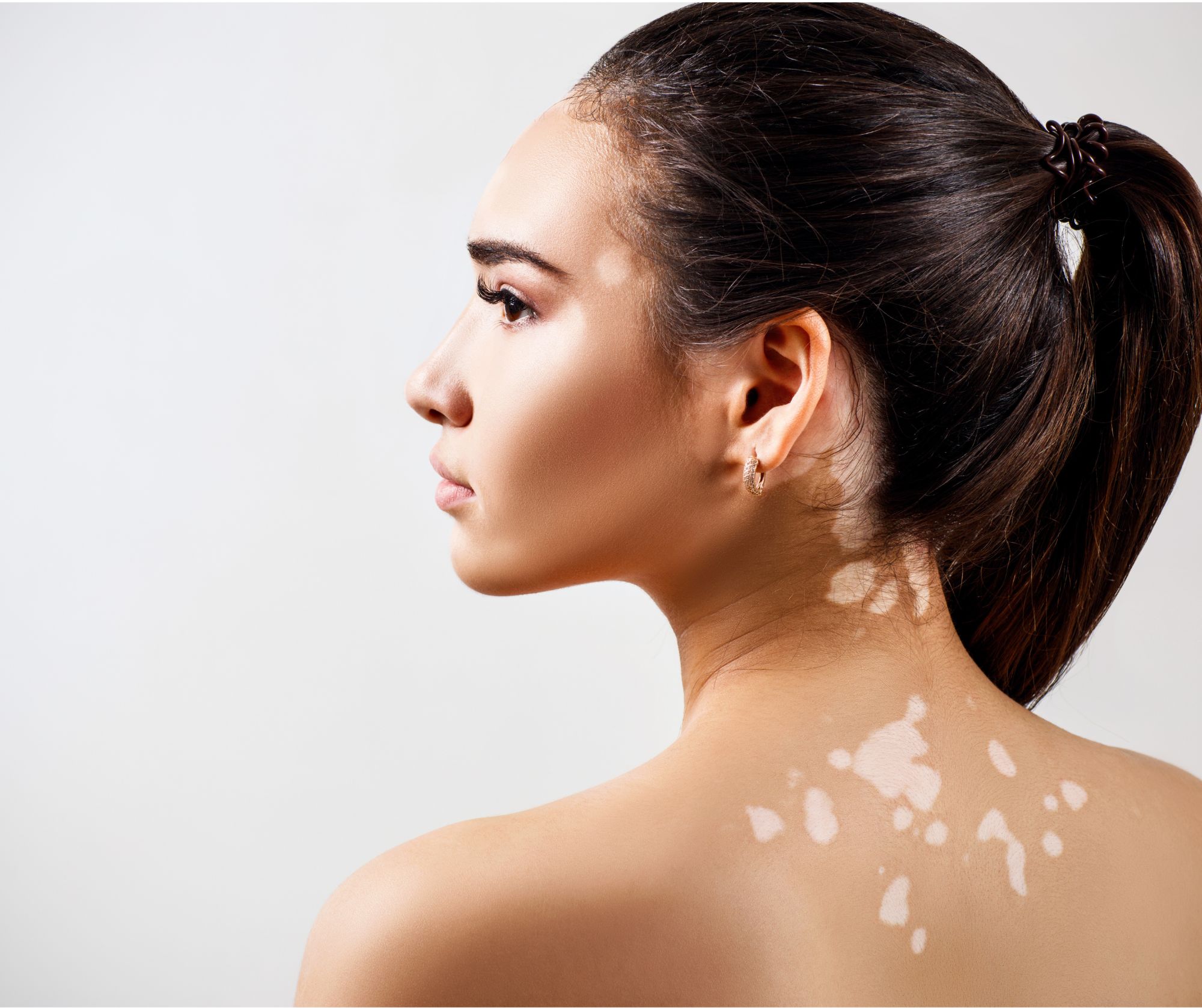Feel Confident In Your
Own Skin Again
Vitiligo is a skin condition that affects melanin production in the body. Some with the condition develop only a few patches; others can lose color across their whole body. At Chicago Skin Clinic, our goal is to help you even your skin tone and step back into your confident life.
What Is Vitiligo?
Vitiligo is a chronic autoimmune disease that causes the skin to lose its natural color. Some people develop only a few patches; others can lose color across their whole body.
While the exact reason isn’t completely known, we do know that vitiligo is not contagious or life-threatening.
Those with vitiligo, though, can experience it as life-altering. It can impact your self-esteem, make you want to go out less, and can even lead to serious depression in some cases.
Like any autoimmune disease, scientists believe the reason for vitiligo is your body’s immune system attacking and destroying the skin cells that produce melanin, which gives the skin its color.
Who Does Vitiligo Affect?
Vitiligo can affect anyone, regardless of race or sex, and can develop at any age. It is more common to appear before the age of 20 and can begin in early childhood.
If you have a family history of vitiligo or have other autoimmune diseases such as thyroid disease or type 1 diabetes, these can be risk factors for the condition to appear. While vitiligo is often a chronic condition, depending on the severity, it doesn’t have to control your life.
The Symptoms
The primary symptom of vitiligo is the loss of natural color or pigment across the body, called depigmentation. Depigmentation can occur anywhere but more often affects these regions:
- Skin, often on hands, feet, arms or face, and appear as white patches.
- Hair, either on the scalp, eyebrow, eyelash, beard, or body hair, again appears as white.
- Mucous membranes, like the inside of your mouth or nose.

Treating Vitiligo At Chicago Skin Clinic
At Chicago Skin Clinic, Dr. Danny Del Campo and Dr. Danilo Del Campo will diagnose and track your condition if you show signs of vitiligo. We’ll review your medical and family history, perform a physical exam, and recommend a blood test to check the health of your thyroid gland, as some people who have vitiligo also have thyroid disease.
Once we have established your condition, we’ll begin working with you to create a personalized and effective treatment plan. Let’s break down some of these treatment options.
Cosmetics
Before visiting us, the simplest solution can be the easiest. By using cosmetics like foundations and concealers on the affected areas, we’ll be able to camouflage the area to your natural color. Waterproof options are also available, which can provide long-lasting coverage.
You can apply self-tanning lotions or sprays to the white patches of skin. These products contain ingredients that help produce darker pigment.
Medication
By using medicines or medicated skin creams, we can attempt to return color to the white patches on the skin. Certain vitamins, minerals, amino acids, or enzymes can restore your natural skin color.
- Anti-Inflammatory Medications: Applying an anti-inflammatory cream to the affected area can return color, but it’s important to note that this method is used for the early stages of vitiligo, as that’s when it’s most effective. Pills or injections are sometimes used for those with a rapidly progressing condition.
- Immune System Medications: Certain inhibitor ointments can be effective for those with small areas of depigmentation, particularly on the face or neck. They work by moderating your immune system, reducing inflammation which can help restore skin color.
Light Treatment
Light therapy, or phototherapy(also known as narrowband ultraviolet phototherapy nbUVB), is a common treatment we’ll use to treat vitiligo. With light therapy, we’ll expose the affected skin to ultraviolet light under medical supervision. Phototherapy can be used alone or in combination with medications that make the skin more sensitive to the effects of light.
Surgery
If all other options fail to restore your natural skin color, Dr. Danny Del Campo and Dr. Danilo Del Campo may recommend surgery as an option.
Depigmentation
As a last resort, depigmentation therapy is typically recommended for those who have vitiligo affecting more than 50% of their body or individuals who have not responded to other treatments.
Depigmentation aims to remove the remaining pigmentation from the skin to achieve a uniform color. Rather than trying to restore the lost color, Dr. Danny Del Campo and Dr. Danilo Del Campo will instead eliminate the remaining color.
Therapy involves using medications to inhibit the production of melanin when applied to the skin. Over time, roughly 12 to 14 months, the treated areas may lighten and match the vitiligo-affected areas.
Depigmentation is a significant decision that comes with its own set of risks and considerations. Our doctors will evaluate and discuss with you the potential risks and benefits before deciding on this treatment.

Renewed Confidence Is A Consultation Away
At Chicago Skin Clinic, we’re ready for you to take the next step in understanding your condition. Schedule a consultation today and meet with Dr. Danny Del Campo and Dr. Danilo Del Campo to discuss your condition and recommend the best treatment plan to manage your vitiligo.
With our comprehensive approach, you can improve the appearance of your skin and boost your confidence. We’re here to support you at every step of your vitiligo journey.
 SCHEDULE NOW
SCHEDULE NOW